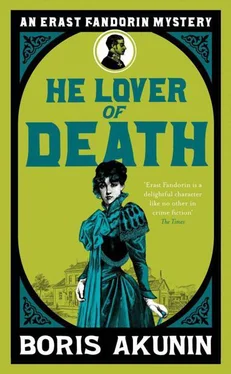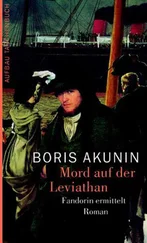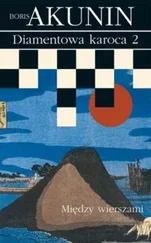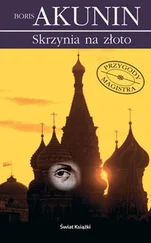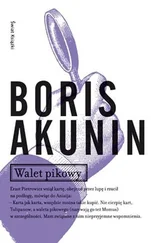Senka was extremely nervous (that is, he was in a real lather) in case the judge said: What the hell does my adopted son want with scummy relatives like that?
But it went off all right. George came back delighted with himself and announced that they were expecting him at three. So not for lunch, Senka twigged, but he didn’t take offence; on the contrary, he was glad, because he still wasn’t too good with table knives and telling the meat forks from the ones for fish and salad.
It said in the book: ‘When paying a visit to children, one should give them a present of sweets in a bonbonnier’, and Senka didn’t play the tightwad, that is he didn’t penny-pinch – he bought the very finest tin of chocolate from Perlov’s on Myasnitskaya Street, in the shape of the little humpbacked horse from the fairy tales.
He hired a shiny lacquered carriage for a five-rouble note, but his nerves were so bad he set out way too early, and at first he walked along the street with the carriage driving behind him.
He tried to step out the way the textbook said you should: ‘In the street, the well-bred, refined individual is easily distinguished. His gait is always steady and measured, his stride is confident. He walks straight ahead, without looking round, and only occasionally stops for a moment in front of shops, usually stays on the right-hand side of the road and looks neither up nor down, but several paces straight ahead of himself.’
He walked that way down Myasnitskaya Street, Lyubanka Street and Theatre Lane. And when he got a stiff neck from looking ahead of him all the time, he got into the carriage.
They drove as far as the apple orchards in Konkovo, all unhurried, but just before Tyoply Stan the passenger told the driver to put on some speed so they would drive up to the judge’s house at a spanking pace, looking good, with real chic.
He walked into the house in fine old fashion, said bonjour and bowed.
Judge Kuvshinnikov replied: ‘Hello, Semyon Spidorov,’ and asked him to take a seat.
Senka sat there modestly and politely. He took off his right glove, but not the left, the way you’re supposed to at the start of a visit, and put his hat on the floor, only without any napkin. And when he’d managed all that, he took a proper look at the judge.
Ippolit Ivanovich had got old, you could see that from close up. His horseshoe moustache had turned grey. The long hair hanging down below his ears was all white too. But his gaze was the same as ever: black and piercing.
Senka’s old dad used to say that in the whole wide world you could never find anyone cleverer than Judge Kuvshinnikov, and so, when he gazed into Ippolit Ivanovich’s stern eyes, Senka decided he would forget the rules of etiquette and behave with genuine courtesy, as he had been taught, not by George, and not by a book, but by a certain individual (we’ll get to him later, we’ve got ahead of ourselves).
This individual had told him that genuine courtesy was founded not on polite words, but on sincere respect: Respect any person as far as that is possible, until that person has shown himself unworthy of your respect.
Senka had thought about this strange assertion for a long time, and eventually explained it to himself like this: It’s better to flatter a bad man than offend a good one – wasn’t that it?
So he didn’t try to make polite conversation with the judge about the pleasantly cool weather; he said in all honesty, with a bow: ‘Thank you for raising my brother, an orphan, as your own son and not offending him in any way. And Jesus Christ will show you even greater gratitude for it.’
The judge leaned forward and said there was no need for thanks, Vanya brought himself and his wife nothing but joy and delight in their old age. He was a lively boy, with a tender heart and great abilities.
Well, that was that. Then they said nothing for a while.
Senka racked his brains – how could he bring the conversation round to seeing his little brother? He started sniffing with the strain of it, but immediately remembered that ‘the loud sniffing in of nasal fluid in company is absolutely impermissible’, and quickly pulled out his handkerchief to blow his nose.
The judge said: That friend of yours who called this morning said you were a “well-to-do merchant-trader” . . .’
Senka thrust out his chest, but not for long, because Ippolit Ivanovich went on like this: ‘Where did the money come from, for the shiny carriage, the frock coat and the top hat? I correspond with your guardian, Zot Larionovich Puzyrev. All these years I’ve been sending him a hundred roubles every three months for your keep, I receive reports. Puzyrev wrote that you didn’t want to study at the grammar school, that you are wild and ungrateful and consort with all sorts of riff-raff. And in his last letter he informed me that you had become a thief and a bandit.’
Senka was so taken by surprise that he leapt to his feet and shouted – it was stupid of course, he should have kept his mouth shut: ‘Me, a thief? When did he ever catch me?’
‘When they do catch you, Senya, it will be too late!’
‘I didn’t want to go to the grammar school? He was getting a hundred roubles for me?’
Senka choked. What a skunk his Uncle Zot was! Smashing those windows was too good for him, he should have set the house on fire!
‘So where does your wealth come from?’ the judge asked. ‘I have to know before I can let you see Vanka. Perhaps your frock coat was cut from blood and sewn with tears.’
‘It’s not cut from any blood. I found a treasure, an old one,’ Senka muttered, realising as he said it that no one would ever believe that.
So much for driving up in grand style and presenting his little brother with the sweets! His old dad was right: the judge was a clever man.
But Kuvshinnikov turned out to be even cleverer than that. He didn’t smack his lips in disbelief, he didn’t shake his head. He asked calmly: ‘What kind of treasure? Where from?’
‘Where from? From the Khitrovka basements, that’s where from,’ Senka replied sullenly. ‘There were some silver rods there, with a stamp on them. Five of them. They’re worth a lot of money.’
‘What kind of stamp?’
‘How would I know? Two letters: “Y” and “M”.’
The judge looked at Senka for a long time, without saying a word. Then he got up. ‘Let’s go into the library.’
That was a room covered all over from top to bottom with books. If all the books Senka had ever seen in his life were put together, there still probably wouldn’t be as many.
Kuvshinnikov climbed up a ladder and took a thick volume down off a shelf. He started leafing through from his perch.
‘Aha,’ he said.
Then: ‘Hmmm. Yes, yes.’
He looked at Senka over the top of his specs and asked. ‘“YM”, you say? And where did you find the treasure? Not in the Serebryanniki district, was it?’
‘No, in Khitrovka, honest to God,’ said Senka, crossing himself.
Ippolit Ivanovich climbed down the ladder quickly, put the book on a table and went over to a picture that was hanging on the wall. It was a queer-looking picture, like a drawing of the way pork carcasses were butchered that Senka had once seen in a German meat shop.
‘Here, take a look. This is a map of Moscow. This is Khitrovka, and this is Serebryanniki, the lane and the embankment. It’s just a stone’s throw from Khitrovka.’
Senka went over and tried to take it in. Just to be on the safe side, he said: ‘Of course.’
But the judge wasn’t looking at Senka, he was muttering away to himself: ‘Why, yes! In the seventeenth century that’s where the Silversmiths’ Quarter used to be, the place where the master craftsmen from the Yauza Mint lived. What do your rods look like? Like this?’
Читать дальше
